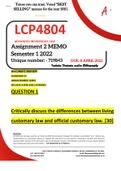Tutors you can trust. Voted “BEST
SELLING” memos for the year 2021.
A +
LCP4804
ADVANCED INDIGENOUS LAW
Assignment 2 MEMO
Semester 1 2022
Unique number: - 719843 DUE: 8 APRIL 2022
Includes Footnotes and/or Bibliography
DOCUMENT PREVIEW
ASSIGNMENT 02
UNIQUE NUMBER: 719843
DUE DATE: 8 APRIL 2022 ( EXTENDED)
QUESTION 1
Critically discuss the differences between living
customary law and official customary law. [30]
Disclaimer
Extreme care has been used by our Tutors to draft this document, however the contents are provided “as is” without any
representations or warranties, express or implied. This document is to be used for comparison, research and reference
purposes ONLY. No part of this document may be reproduced, resold or transmitted in any form or by any means without
prior written permission from the Author. – LLB EXAMPACKS & TUTORIALS.
PAST PAPERS & MEMOS, ASSIGNMENT MEMOS, NOTES, SUMMARIES & TUITONS.
Cell: 084 591 8661 Email: llbexampacks@gmail.com
Fax: 086 096 5452 www.llbexampacksandtutorials.co.za
, DUE DATE: 01 APRIL 2022 (08:00 AM)
Unique Number: 719843.
QUESTION 1
Critically discuss the differences between living customary law and official customary law. [30]
Customary law is defined in section 1 of the Recognition of Customary Marriages Act (hereafter referred to as
RCMA) as the “usages and customs traditionally observed among the indigenous African peoples of South Africa”,
which “forms part of the culture of those peoples”. In understanding customary law, an important distinction
needs to be drawn between codified customary law and living customary law. Codified customary law, also
referred to as official customary law, comprises what was an oppressive form of customary law developed by
colonial and apartheid states which exists in codes and precedents. It has been argued that much of the customary
law in the courts before 1994 was drawn from texts or precedents and is therefore of dubious validity.1
Living customary law, on the other hand, exists in the system of living norms that regulate the everyday lives of
people who live according to customary law. This system of law is dynamic, evolving and context-specific as it
adapts to changes in the beliefs and circumstances of the people it applies to. 2
The recognition and application of customary law rests on the right to culture.3 Historically Black South Africans
were positioned “outside of the law”, 4which means they were subordinated by, and denied protection from,
customary and state support systems in the apartheid and colonial contexts.5
All forms of discrimination are prohibited under the Constitution. Therefore, the South African Law Commission’s
Project Committee on Customary Law in 1996 identified the need to ensure that customary marriages be
recognised and comply with constitutional rights, especially the rights guaranteeing equality and non-
1 Himonga C (2011) The future of living customary law in African legal systems in the 21st century and beyond, with special
reference to South Africa. In: Fenrich J, Galizzi P & Higgins T (eds) The Future of Customary Law. Cape Town: Cambridge
University Press. PP. 31-57.
2 Himonga C (2011) The future of living customary law in African legal systems in the 21st century and beyond, with special
reference to South Africa. In: Fenrich J, Galizzi P & Higgins T (eds) The Future of Customary Law. Cape Town: Cambridge
University Press. PP. 31-57.
3 Constitution of the Republic of South Africa, Act 108 of 1996.
4 Nhlapo T (1995) African customary law in the interim Constitution. In: South African Child Gauge 2018 Liebenberg S (ed) The
Constitution of South Africa from a Gender Perspective. Cape Town: Community Law Centre, University of the Western Cape.
P. 162.
5 Himonga C & Moore E (2015) Reform of Customary Marriage, Divorce and Succession in South Africa: Living Customary
Law and Social Realities. Cape Town: Juta and Co.





